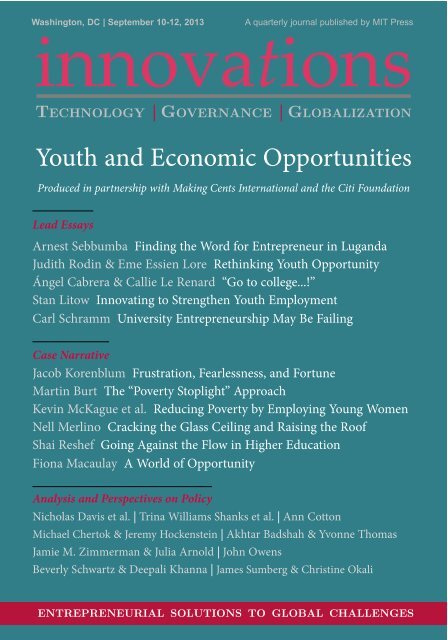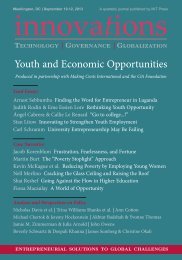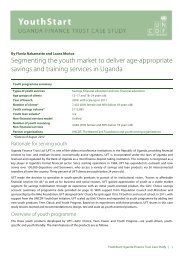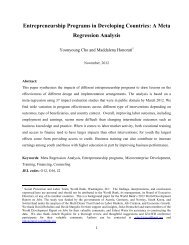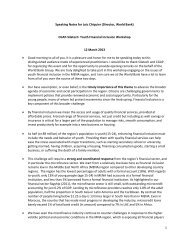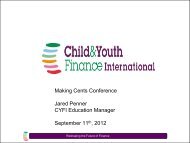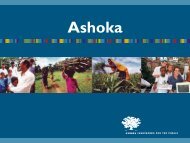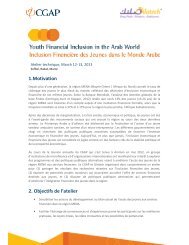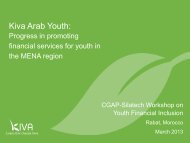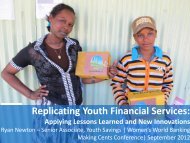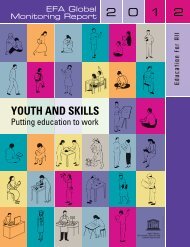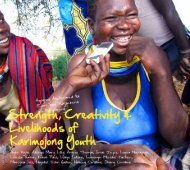Download - Youth Economic Opportunities
Download - Youth Economic Opportunities
Download - Youth Economic Opportunities
Create successful ePaper yourself
Turn your PDF publications into a flip-book with our unique Google optimized e-Paper software.
Washington, DC | September 10-12, 2013 A quarterly journal published by MIT Press<br />
innovations<br />
TECHNOLOGY | GOVERNANCE | GLOBALIZATION<br />
<strong>Youth</strong> and <strong>Economic</strong> <strong>Opportunities</strong><br />
Produced in partnership with Making Cents International and the Citi Foundation<br />
Lead Essays<br />
Arnest Sebbumba Finding the Word for Entrepreneur in Luganda<br />
Judith Rodin & Eme Essien Lore Rethinking <strong>Youth</strong> Opportunity<br />
Ángel Cabrera & Callie Le Renard “Go to college...!”<br />
Stan Litow Innovating to Strengthen <strong>Youth</strong> Employment<br />
Carl Schramm University Entrepreneurship May Be Failing<br />
Case Narrative<br />
Jacob Korenblum Frustration, Fearlessness, and Fortune<br />
Martin Burt The “Poverty Stoplight” Approach<br />
Kevin McKague et al. Reducing Poverty by Employing Young Women<br />
Nell Merlino Cracking the Glass Ceiling and Raising the Roof<br />
Shai Reshef Going Against the Flow in Higher Education<br />
Fiona Macaulay A World of Opportunity<br />
Analysis and Perspectives on Policy<br />
Nicholas Davis et al. | Trina Williams Shanks et al. | Ann Cotton<br />
Michael Chertok & Jeremy Hockenstein | Akhtar Badshah & Yvonne Thomas<br />
Jamie M. Zimmerman & Julia Arnold | John Owens<br />
Beverly Schwartz & Deepali Khanna | James Sumberg & Christine Okali<br />
ENTREPRENEURIAL SOLUTIONS TO GLOBAL CHALLENGES
innovations<br />
TECHNOLOGY | GOVERNANCE | GLOBALIZATION<br />
Introductory Essays<br />
5 Guest Editor’s Introduction<br />
Making Cents International and Citi Foundation<br />
7 Investing in the <strong>Economic</strong> Progress of <strong>Youth</strong><br />
Jasmine Thomas<br />
Lead Essays<br />
13 Finding the Word for Entrepreneur in Luganda<br />
Arnest Sebbumba<br />
19 <strong>Youth</strong> Opportunity: Rethinking the Next Generation<br />
Judith Rodin and Eme Essien Lore<br />
27 “Go to college, young men and women, go to college!”<br />
Ángel Cabrera and Callie Le Renard<br />
35 Innovating to Strengthen <strong>Youth</strong> Employment<br />
Stanley Litow<br />
43 University Entrepreneurship May Be Failing Its Market Test<br />
Carl Schramm<br />
Case Narratives<br />
49 Frustration, Fearlessness, and Fortune: How <strong>Youth</strong>-Led Startups<br />
Are Redefining Entrepreneurship<br />
Jacob Korenblum<br />
Fundación Paraguaya<br />
55 The “Poverty Stoplight” Approach to Eliminating<br />
Multidimensional Poverty: Business, Civil Society, and<br />
Government Working Together in Paraguay<br />
Martin Burt<br />
Special Issue for the 2013 Global <strong>Youth</strong> <strong>Economic</strong> <strong>Opportunities</strong> Conference
Hathay Bunano<br />
77 Reducing Poverty by Employing Young Women: Hathay<br />
Bunano’s Scalable Model for Rural<br />
Production in Bangladesh<br />
Kevin McKague, Samantha Morshed,<br />
and Habibur Rahman<br />
Count Me In for Women’s <strong>Economic</strong> Independence<br />
97 Cracking the Glass Ceiling and Raising the Roof<br />
Nell Merlino<br />
University of the People<br />
109 Going Against the Flow in Higher Education:<br />
Deliberately Including those Previously Excluded<br />
Shai Reshef<br />
Making Cents International<br />
125 Toward a World of Opportunity<br />
Fiona Macaulay<br />
Analysis<br />
149 TEN <strong>Youth</strong>: Unlocking Enterprise Growth by Focusing on<br />
the Fortune at the Bottom of the Talent Pyramid<br />
Nicholas Davis, Ebba Hansmeyer, Branka Minic,<br />
Shantanu Prakash, and Subramanian Rangan<br />
167 Financial Education and Financial Access: Lessons<br />
Learned from Child Development Account Research<br />
Trina R. Williams Shanks, Lewis Mandell,<br />
and Deborah Adams<br />
Perspectives on Policy<br />
185 Sourcing Change: Digital Work Building Bridges<br />
to Professional Life<br />
Michael Chertok and Jeremy Hockenstein<br />
197 <strong>Youth</strong>Spark and the Evolution of a Corporate<br />
Philanthropy Program<br />
Akhtar Badshah and Yvonne Thomas<br />
211 It’s All About the Jobs<br />
Jamie McAuliffe, Jasmine Nahhas di Florio,<br />
and Pia Saunders
227 Who Teaches Us Most About Financial Programing<br />
in Africa<br />
Ann Cotton<br />
241 Hope or Hype Five Obstacles to Mobile Money<br />
Innovations for <strong>Youth</strong> Financial Services<br />
Jamie M. Zimmerman and Julia Arnold<br />
255 Future Forward: Innovations for <strong>Youth</strong> Employment<br />
in Africa<br />
Beverly Schwartz and Deepali Khanna<br />
267 Young People, Agriculture, and Transformation in<br />
Rural Africa: An “Opportunity Space” Approach<br />
James Sumberg and Christine Okali<br />
279 Offering Digital Financial Services to Promote Financial<br />
Inclusion: Lessons We’ve Learned<br />
John Owens<br />
About Innovations<br />
Innovations is about entrepreneurial solutions to global challenges.<br />
The journal features cases authored by exceptional innovators; commentary and<br />
research from leading academics; and essays from globally recognized executives and<br />
political leaders. The journal is jointly hosted at George Mason University's School of<br />
Public Policy, Harvard's Kennedy School of Government, and MIT's Legatum Center<br />
for Development and Entrepreneurship. Topics of interest include entrepreneurship<br />
and global development, the revolution in mobile communications, global public<br />
health, water and sanitation, and energy and climate.<br />
Authors published in Innovations to date include three former and one current head of<br />
state (including U.S. Presidents Carter and Clinton); a Nobel Laureate in <strong>Economic</strong>s;<br />
founders and executive directors of some of the world’s leading companies, venture<br />
capital firms, and foundations; and MacArthur Fellows, Skoll awardees, and Ashoka<br />
Fellows. Recently the journal has published special editions in collaboration with the<br />
Clinton Global Initiative, the World <strong>Economic</strong> Forum, the Rockefeller Foundation,<br />
Ashoka, the Lemelson Foundation, and Social Capital Markets.<br />
Subscribe at<br />
http://www.mitpressjournals.org/innovations
Making Cents International and<br />
Citi Foundation<br />
Introduction to the Special Issue<br />
This youth-focused double issue is the product of a shared passion to improve<br />
livelihoods and economic opportunities among the world’s 1.8 billion youth. The<br />
publication is particularly timely given the increased focus being given to programming,<br />
funding, and research on the contributions of young people in a time<br />
of economic volatility. As the economy shows signs of recovery, the International<br />
Labor Organization reports that the global rate of youth unemployment hovers<br />
around 13%, just below the jobless rate at the peak of the crisis—this still represents<br />
an estimated 73 million young people. Despite staggering unemployment,<br />
our concern is not the scale of the problem. Instead, we are encouraged by the scale<br />
of the opportunity before us.<br />
With the support and collaboration of the Citi Foundation, Making Cents<br />
International will leverage this Innovations issue as well as the annual conference,<br />
funder meetings, “Apply It!” webinars, blogs, crowd-sourced solution events, and<br />
other tools to engage a global network of partners to galvanize dialog, collaboration,<br />
and knowledge-building toward a collective global agenda for youth.<br />
Through its Collaborative Learning and Action Institute (Co-Lab), Making Cents<br />
will promote and improve economic opportunities for youth around the world.<br />
This year, the Co-Lab aims to strengthen knowledge management in the field,<br />
enhancing the scope and depth, diversity, and quality of how and what our people<br />
learn. Co-Lab gives our stakeholders and partners a new platform to both add<br />
value and benefit from knowledge management that translates ideas into solutions.<br />
The following collection of analyses, research, and remarkable stories is a part<br />
of our new vision. In searching for authors, we weren’t searching for all the<br />
answers. We looked across diverse sectors for authors who could connect disparate<br />
concepts, innovations, theories, stories, or research results that move the youth<br />
economic opportunities agenda forward.<br />
To highlight a few authors, first and foremost, we hear the voices of young people<br />
describing the hard work, ambition, fortitude, and support needed from others<br />
to bring innovations to old problems. Arnest Sebbumba, a young farmer, takes us<br />
into rural Africa and reveals the choices, challenges and opportunities facing agricultural<br />
entrepreneurs in Uganda. Social entrepreneur and Founder of Souktel,<br />
Jacob Korenblum, shares the thrills and spills of navigating entrepreneurship and<br />
identifying new opportunities in conflict-environments.<br />
© 2013 Making Cents International and Citi Foundation<br />
innovations / 2013 Global <strong>Youth</strong> <strong>Economic</strong> <strong>Opportunities</strong> Conference 5
Featuring best practices and innovations in youth employment, Jamie<br />
McAuliffe’s case study of Employment for Education demonstrates how the NGO<br />
created a youth jobs model that reverses conventional supply-driven education<br />
processes that often widens unemployment. Meanwhile, Michael Chertok and<br />
Jeremy Hockenstein, of Digital Divide Data, highlight a growing $300 billion business<br />
process outsourcing industry, and the economic potential of Impact Sourcing<br />
as a “game-changer” for scaling<br />
skilled jobs among youth.<br />
Innovations aimed at increasing<br />
financial education, access, and inclusion<br />
among young people is critical.<br />
Research from Jamie Zimmerman<br />
and Julia Arnold of the New America<br />
Foundation chronicles various models<br />
that incorporate mobile technology<br />
into youth financial services programs,<br />
illustrating both the promise<br />
and, notably, high-cost and regulatory<br />
barriers to implementation.<br />
Underscoring the critical role of<br />
the private sector, Branka Minic, Nicholas Davis, and Ebba Hansmeyer and their<br />
team approach youth capacity from the perspective of developing talent within the<br />
corporate workforce. Their model enables businesses to find and develop talent to<br />
fuel growth, productivity, efficiency, and innovation while providing young people<br />
with the skills and knowledge they need to more easily secure employment.<br />
Simultaneously, Akhtar Badshah and Yvonne Thomas of Microsoft, reflect upon<br />
the company’s core philanthropic philosophy—providing information and communications<br />
technology (ICT) training that empowers individuals with highdemand<br />
skills.<br />
We extend our sincere thanks and appreciation to the authors who invested<br />
their time, energy, and expertise to produce this special issue, which both embodies<br />
and inspires a guiding theme of collaboration. And, in that spirit, we ask readers<br />
to consider how they might apply these lessons and innovations to their own<br />
work, and share their results with us. Many of these authors will be featured in<br />
“Apply It” learning events throughout the coming year at<br />
www.<strong>Youth</strong><strong>Economic</strong><strong>Opportunities</strong>.org. We look forward to your participation.<br />
Making Cents International<br />
Making Cents International and Citi Foundation<br />
This youth-focused double<br />
issue is the product of a<br />
shared passion to improve<br />
livelihoods and economic<br />
opportunities among the<br />
world’s 1.8 billion youth.<br />
Citi Foundation<br />
6 innovations / <strong>Youth</strong> and <strong>Economic</strong> <strong>Opportunities</strong>
Jacob Korenblum<br />
Frustration, Fearlessness, and Fortune<br />
How <strong>Youth</strong>-Led Startups<br />
Are Redefining Entrepreneurship<br />
In 2005, armed with two years of college Arabic and a vague employment contract,<br />
I tumbled out of a taxi and onto the main street of Ramallah, Palestine. The region<br />
was anything but stable. Six months after my arrival, Hamas won its first elections<br />
and came to rule the West Bank; roughly 18 months after that, the party was ousted<br />
in a series of bloody clashes and retreated to Gaza. Meanwhile, the Israeli military<br />
occupation of both areas continued unchecked, as it had for close to 40 years.<br />
Against this backdrop, my employer, a U.S.-based aid agency, was focused on<br />
a unique set of priorities: holding focus groups with young Palestinians to hear<br />
their views on youth economic opportunity and entrepreneurship, and to ask what<br />
we (as international interlopers) could do to help boost economic growth in the<br />
country. While we moved from town to town, chatting with group after group of<br />
earnest youth, two things happened. First, I got bored by the two-hour meetings.<br />
Second, I noticed that everyone everywhere had a cell phone and that they were<br />
using them constantly to send text messages to each other—hardly an earth-shattering<br />
observation in 2013. However, close to 10 years ago, only half the population<br />
in my own home country, Canada, owned a cell phone, and at the time most<br />
people didn’t see it as a vital device.<br />
As the weeks passed, my frustration with the tried-and-true focus group<br />
approach mounted. At first I was too timid to speak out (this was, more or less, the<br />
first real job I’d ever held and I considered myself lucky to have it). Ultimately,<br />
though, I ended up spending any spare moment I could sketching out text-message<br />
sequences with some friends. As we started to build a team and a concept, we mustered<br />
up the courage to leave our day jobs and focus on the idea full time. And<br />
while some criticized us for “having it too easy” or “having all the luck in the<br />
world” by being able to work on our own clock without a boss or a 9-to-5 schedule,<br />
we were simply thankful to have a window of uninterrupted time to try out<br />
something new. Unbeknownst to us, we were about to come up with a mobile solu-<br />
Based in Ramallah, Palestine, Jacob Korenblum is CEO and co-founder of Souktel,<br />
the Middle East’s first mobile job information service. He is a past Reynolds<br />
Foundation Social Enterprise Fellow at Harvard University, and a 2010 Silicon Valley<br />
Tech Awards Laureate.<br />
© 2013 Jacob Korenblum<br />
innovations / 2013 Global <strong>Youth</strong> <strong>Economic</strong> <strong>Opportunities</strong> Conference 49
Jacob Korenblum<br />
Souktel—as our mobile job<br />
service came to be known—has<br />
been fortunate to help youth in<br />
21 countries ... Through a<br />
process that’s low-cost and easy<br />
to understand, the service has<br />
allowed thousands of jobseekers<br />
with basic cell phones<br />
to create text-, audio-, or webbased<br />
“mini-CVs”—with<br />
information about their skills<br />
and work experience.<br />
tion that would help thousands of people find work more easily: linking job seekers<br />
with local employers via text message.<br />
Fast-forward seven years, and Souktel—as our mobile job service came to be<br />
known—has been fortunate to help youth in 21 countries, to be profiled in the<br />
Wall Street Journal, and to raise venture funding from a group of investors that<br />
includes household names like Google and Cisco. Through a process that’s lowcost<br />
and easy to understand,<br />
the service has allowed thousands<br />
of job-seekers with<br />
basic cell phones to create<br />
text-, audio-, or web-based<br />
“mini-CVs”—with information<br />
about their skills and<br />
work experience. These profiles<br />
are then auto-matched<br />
with jobs that are listed by<br />
employers through a similar<br />
process, and both sets of users<br />
get SMS alerts with the other’s<br />
contact details. Now that<br />
we’ve reached scale, we frequently<br />
are asked the same<br />
question by aspiring startups<br />
and high-level decisionmakers:<br />
What’s the secret to building<br />
a successful youth enterprise<br />
Naturally there’s no simple<br />
answer, but I usually respond<br />
the same way each time I’m asked: from our experience, as a group of Palestinians,<br />
Canadians, and Americans, we’ve achieved success by taking the very concepts that<br />
often are used to define youth negatively—especially in the Arab world—and<br />
inverting them to achieve positive aims. To be specific, we believe that the path to<br />
successful youth entrepreneurship is defined by three key factors: frustration, fearlessness,<br />
and fortune—and by “fortune,” I mean luck; the money, if it comes, is seldom<br />
in the picture at the beginning.<br />
Young entrepreneurs are frustrated. We’re never content with the status quo<br />
and are always seeking to combat what we see as inefficiencies in the world around<br />
us: Why should I call several taxi companies to hail a cab when a single app could<br />
let me find a car that’s down the street Why walk miles to charge my phone when<br />
a solar device lets me do it at home In each of these cases (and there are hundreds<br />
if not thousands of them), “productive frustration” has led to the birth of productive<br />
youth-led enterprises. Where Souktel is concerned, it was our dissatisfaction<br />
50 innovations / <strong>Youth</strong> and <strong>Economic</strong> <strong>Opportunities</strong>
Frustration, Fearlessness, and Fortune<br />
with traditional ways of solving youth unemployment that led us to become bored,<br />
frustrated, and eventually innovative.<br />
However, in much of the Arab and Muslim world, “youth” and “frustration” are<br />
often uttered in the same breath but with much less positive associations. “Are<br />
Frustrated, Idle <strong>Youth</strong> in Somalia a Threat to the World” asks a September 2012<br />
Reuters headline. “Riots in Stockholm Continue as <strong>Youth</strong> Vent Frustrations,” read<br />
a headline in Germany’s Der Spiegel this past May. While policy experts and decisionmakers<br />
unveil new initiatives aimed at helping youth realize their potential,<br />
the media—a much more powerful amplifier—conflates young people and their<br />
frustration with danger and the destruction of property. Of course this isn’t always<br />
the case and not all media follow this line, but rare is the time I’ve read a headline<br />
that proclaims, “<strong>Youth</strong> Channel Frustration to Build New Social Venture.” My<br />
point here is that I believe we can do a great deal to help young people in Egypt or<br />
Indonesia to harness their frustrations to positive goals instead of castigating youth<br />
for being fed up with their surroundings.<br />
Beyond being frustrated, successful young entrepreneurs are also fearless. We<br />
don’t take “no” for an answer, and we don’t balk at risk. In my first few weeks in<br />
Palestine, I slept on the floor of my bedroom, away from the window, as tracer fire<br />
lit up the valley below our apartment building each night. As a Canadian, this was<br />
a shocking new reality; for my young Palestinian colleagues, this was daily life—<br />
and had been for decades. But life in a conflict zone also had taught our team<br />
members from the region not to sweat the small stuff. If our prototype failed the<br />
day before an important pitch, they weren’t phased by it. If our servers went down<br />
for an hour, we all worked quickly to figure out where the problem lay, but without<br />
getting scared. This may sound like an opportunistic corollary to connect the<br />
dots between fearlessness under fire (literally) and fearlessness in the face of startup<br />
market pressures, but I firmly believe that our experience cutting our teeth in<br />
Palestine during some of the region’s more difficult recent moments (the 2006<br />
Lebanon war and the 2008 invasion of Gaza, among others) has helped us put our<br />
startup challenges into perspective and enabled us to forge ahead more boldly with<br />
our entrepreneurial plans.<br />
During the 2011 London riots, a Guardian piece entitled “Who Are the<br />
Rioters” followed a group of young women and men as they torched vehicles and<br />
vandalized shops. Characterized mainly by their brazenness and lack of trepidation<br />
in the face of local law enforcement, these youth were every adult’s worst<br />
nightmare: “She helped set a motorbike alight, walking away with her hands aloft,”<br />
wrote correspondents Paul Lewis and James Harkin of one girl’s exploits, thus<br />
painting a vivid picture of daring triumphalism in the midst of utter anarchy. In<br />
our first-ever “elevator pitch,” at the Harvard Business School’s Business Plan<br />
Competition, we had literally four minutes to extoll the virtues of our new, as-yetuntested<br />
technology. We swallowed hard, and walked away with our hands aloft as<br />
well; not only had we unwittingly harnessed fearlessness and used it to our advantage,<br />
we’d scored a runner-up finish in the social venture category. There is a world<br />
of difference between these examples, of course: Harvard is by no means a London<br />
innovations / 2013 Global <strong>Youth</strong> <strong>Economic</strong> <strong>Opportunities</strong> Conference 51
Jacob Korenblum<br />
public housing estate. But I present this contrast, and commonality, deliberately:<br />
Each year a handful of Palestinians, many from rural villages, journey to Harvard<br />
and MIT on full scholarships. With the right support in place, this trickle could<br />
turn into a flood, and young people in Cairo or Tunis could be channeling their<br />
fearlessness, en masse, from the streets to the executive boardrooms of venture<br />
capital firms in New York or Silicon Valley. Precedents are already being set in this<br />
regard. Initiatives like the MasterCard Foundation’s half-billion-dollar Scholars<br />
Program fund African youth leaders to study at Stanford, Berkeley, and a wide<br />
range of top schools across Africa and North America.<br />
Beyond frustration and fearlessness, young entrepreneurs are ultimately<br />
blessed with good fortune. Of course, a large part of Souktel’s success is due to the<br />
hard work and tremendous skill of our team. But to a certain extent, we were simply<br />
lucky. We took a gamble that mobile phones would become the “next big thing”<br />
in youth financial inclusion when local employers, international donors, and the<br />
general public still maintained that texting “LOL” was the main purpose of a<br />
mobile handset. Even armed with reams of market research, we had no way of<br />
knowing that our innovation would eventually take off and reach scale. As hard as<br />
we’ve worked to achieve our venture’s growth, we’re also innately aware that factors<br />
beyond our control helped us get where we are.<br />
Souktel was once approached by an American venture capital fund that had<br />
developed a unique algorithm: by drawing on “big data” from the entrepreneurship<br />
sector and applying computer-generated screening criteria, the formula could<br />
weed out less promising enterprises and hone in on winning ideas, thus creating a<br />
foolproof funding portfolio. The fund was interested in our work, we were<br />
intrigued, and we agreed to move ahead with them in the hope that we might<br />
squeeze through the magic filter and be deemed a successful youth enterprise.<br />
Soon after, though, we were told that we didn’t qualify as a potential investee, as<br />
our funding history didn’t generate enough data points for the software to analyze.<br />
Nonetheless, at roughly the same time, we wrapped up a lengthy—and, in contrast,<br />
very traditional—due diligence process with a Middle East-focused fund that<br />
counted eBay’s Jeff Skoll and Google.org as its backers, and we received $1 million<br />
in financing. Meanwhile, closer scrutiny of the “algorithm fund’s” portfolio showed<br />
that, by its cofounder’s own admission in a 2012 article, “it is too early to report<br />
successes or failures” among the 20-plus startups it had thus far funded through its<br />
model.<br />
My point here is that we can all look for best practices in youth entrepreneurship—and<br />
this is not to say that correlative trends don’t exist—but, from our experience,<br />
many successful enterprises are successful not because they conform to certain<br />
criteria, but because to a large extent they’re lucky to sprout in the right place<br />
at the right time. Would-be entrepreneurs and the funders who support them must<br />
be aware of this reality; venture capital funds and foundations expend tremendous<br />
resources trying to define the key traits of an entrepreneur, or the “secret sauce” of<br />
entrepreneurship, but with limited results. At the same time, youth across the<br />
developing world are often derided by their elders for having all the privileges of<br />
52 innovations / <strong>Youth</strong> and <strong>Economic</strong> <strong>Opportunities</strong>
Frustration, Fearlessness, and Fortune<br />
society and none of the responsibilities—or for sitting idle and abusing the good<br />
fortune that has resulted from their parents’ hard work. “Wayward youth” has been<br />
a North American catchphrase for decades. The challenge for all of us in the youth<br />
entrepreneurship community—decisionmakers, funders, and plucky startups—is<br />
to leverage this good fortune when it happens rather than criticising it. We then<br />
need to move quickly to provide the kind of strategic support that lets innovative<br />
youth enterprises move from startup to scale.<br />
Frustration and fearlessness, when strengthened by good fortune, can yield<br />
incredible results: Otlob in Egypt and Digital Mania Studio in Tunisia are just two<br />
examples of youth-led ventures that have achieved market success since the Arab<br />
Spring. And while conflict continues in Palestine<br />
and nearby Syria—and these harsh realities must<br />
never be overlooked—I firmly believe that we are<br />
currently in a period of good fortune in the Arab<br />
World, at least where youth entrepreneurship is concerned.<br />
Ten years ago, few would have imagined that<br />
Nablus in the Northern West Bank, hemmed in by<br />
Israeli military checkpoints for years, would host an<br />
offshoot of the global Startup Weekend venture contest,<br />
sponsored by Microsoft and Amazon (among<br />
others), where aspiring entrepreneurs would be<br />
mentored by team members from Souktel and other<br />
local tech ventures before pitching their ideas to a<br />
panel of judges. Fewer still would have dreamed that that the Gaza Strip would be<br />
home to Google-supported app developer meetups. The rapid growth of affordable<br />
technologies—especially mobile tech—and the power of these technologies to connect<br />
youth with financial services and entrepreneurship support means that more<br />
young people than ever before are able to turn entrepreneurial dreams into reality.<br />
As a global community, we must now become experts at recognizing frustration<br />
and fearlessness as catalysts for positive change and stand ready to spring into<br />
action when the right mix of frustration, fearlessness, and fortune presents itself.<br />
Life as an entrepreneur is never easy; life as a young entrepreneur in the<br />
Middle East, or any other emerging market, is dramatically more difficult. The<br />
challenges that constrain youth enterprise—access to education, access to capital,<br />
and dynamic institutions, among others—will likely persist, even as the technologies<br />
that help connect youth become cheaper and more widespread. At Souktel,<br />
we’re constantly working to stay two steps ahead of the curve, to provide value to<br />
the communities that use our services, and to stand tall as ambassadors and mentors<br />
for aspiring young businessmen and women across the Arab World. This year<br />
we’re launching new job services in Iraq and Egypt while growing our team and<br />
releasing new products—all at the same time. Every day is difficult, but no day is<br />
ever boring; the realities of being young people living and working in our region<br />
keep us energized and entrepreneurial.<br />
Frustration and<br />
fearlessness, when<br />
strengthened by<br />
good fortune, can<br />
yield incredible<br />
results.<br />
innovations / 2013 Global <strong>Youth</strong> <strong>Economic</strong> <strong>Opportunities</strong> Conference 53
innovations<br />
TECHNOLOGY | GOVERNANCE | GLOBALIZATION<br />
Special Issue for the 2013 Global <strong>Youth</strong> <strong>Economic</strong> <strong>Opportunities</strong> Conference<br />
Guest Edited by Making Cents International<br />
and the Citi Foundation<br />
INNOVATIONS IS JOINTLY HOSTED BY<br />
GEORGE MASON<br />
UNIVERSITY<br />
School of Public Policy<br />
HARVARD UNIVERSITY<br />
Kennedy School of<br />
Government<br />
Belfer Center for<br />
Science and International<br />
Affairs<br />
MASSACHUSETTS<br />
INSTITUTE OF<br />
TECHNOLOGY<br />
Legatum Center for<br />
Development and<br />
Entrepreneurship<br />
School of Public Policy<br />
mitpressjournals.org/innovations<br />
editors@innovationsjournal.net


